Floor Screeding Sandown Isle of Wight (PO36): If you have an uneven or damaged floor, are planning to install under floor heating or are renovating a property or basement, then you will need to find a professional floor screeding company to help you. To provide a solid base for you final flooring material, a screed is used to create a smooth floor surface on top of a rough concrete sub-base. A floor screed is a key aspect of many renovation and building projects in Sandown.
FLOOR SCREEDING CONTRACTORS SANDOWN
It matters not how large or small the area is that you need to be levelled, a certified floor screeding company in Sandown will have the necessary equipment, know-how and expertise to give you an outstanding level of service. Once your project has been diligently assessed, they will be in a position to advise you on the appropriate sort of screed required for your project, and how best to apply and install it.
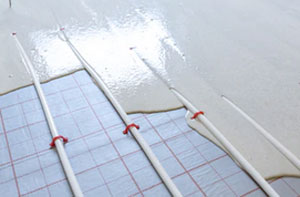
It may be necessary, depending on the proposed use of the space, for a structural engineering survey to conform to building regulations on flex strength, point loadings and load requirements of the screed floor.
Working with a qualified and skilled specialist will ensure you use the proper kind of screed for the room's proposed purpose to extend the lifetime of your flooring. A correct blend of screed and the way it is laid is also critical to ensure the final durability of your floor.
Make sure you get two or three quotations for your Sandown based floor screeding project and also ask what standard of finish each quote is for. The SR (Surface Regularity) finish is the number to look for when receiving an estimate from your Sandown screeding contractor. Each of the 3 SR levels offer different qualities of finish, with SR1 being the best, with the lowest amount of deviation over the area. This could mean that you might have to correct any areas that may cause issues when laying your finished flooring material.
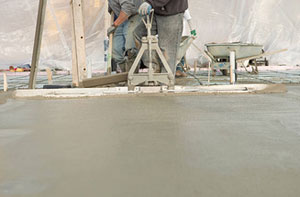
The regulations and guidelines set out in in the British Standards BS8204 must be followed by all Sandown floor screeding companies and they must also hold accreditation with the manufacturers of any specialist screeding materials (Cemfloor, Flowcrete, Gypsol etc.) to verify their safe working practices and competence. The training and testing of a floor screeding company by such manufacturers is underlined by the use of this accreditation scheme, and guarantees reliability and safe working practices on any project which involves their materials.
Commercial screeders in Sandown will usually tackle screeding projects in warehouses, schools, restaurants, hospitals, factories and shopping centres.
TYPES OF SCREED
Standard Screeds - This is perfect for normal domestic use and comprises a combination of sand and cement. The standard screed is a mix of 5 parts sand to one cement. The standard flooring screed will dry at a rate of 1mm thickness per day.
Self-Levelling or Liquid Screeds - A cement and latex mixture which can produce the highest standard of finish to SR1 levels. Largely used to finish off a poor substrate level or damaged floor so as to lay a brand new flooring surface, like tiling on the top of it. Even with a depth of only 1mm, the latex polymers within the screed provide a high strength surface for a wide range of uses.
Fibre Reinforced Screed - Mostly used with under floor heating and is the advised option in these projects. This is due to the improved strength and protection against thermal cracking and shrinkage provided by the special fibres within the screed mix. It sets at an identical rate to a standard screed, at about 1mm per day.
Industrial and Heavy Duty Screed - Designed for maximum strength and durability in places where traffic is expected to be high or specific loading of the floor is needed.
Advanced Drying and Fast Drying Screeds - As the name would suggest, these screeds dry at a quicker rate and allow you to use the floor area much faster. They're normally a fibre reinforced type of screed that dries out at a rate of between 3-7mm per day and are used in time dependent projects.
Polymer Screeds - A high strength flooring solution where a reduced thickness is required. Polymer screeds are available from a number of screed manufacturers and because of their varying chemical compositions have distinct drying times for each individual product.
SCREEDING PREPARATION AND INSTALLATION
Screeding installers will have to prepare the area before any other work so as to guarantee a hard wearing and quality screed flooring. It is vital that all contaminants such as debris, paint, grease or oil is eliminated from the floor before laying any screed, as these can affect the bonding capability that a good quality floor screed requires.
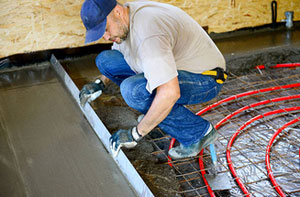
Any cleaning chemicals used during this phase should leave no residues, and the floor surface must be permitted to dry by itself naturally. At this stage any cracks need to be mended since these can travel up through the laid screed and be visible in the finished floor surface. During an on-site survey your Sandown screeding contractor will ascertain what preparation work is required before starting to work on screeding the floor.
To shield the flooring materials and screed layer from dampness rising up from the ground, a damp proof membrane (DPM) will have to be installed. The DPM is made from thick polythene sheet and various layers may be used to act as a moisture barrier for the screeding.
If the area where you live is susceptible to radon gas then an additional barrier is required to stop this harmful gas from entering via the ground. This could be as simple as an airtight membrane, or in severe instances an extraction and ventilation system will need to be installed underneath the floor screed to take away any influx of air and gas from the ground.
The final stage of the surface preparation process is the painting or spraying of a sealer or primer. A primer helps with the screed bonding process to the base and membranes and different varieties exist based upon which screed type is being used. Because of their specialist nature, only experienced screeders in Sandown should be entrusted with using them correctly, safely and through the use of bespoke equipment for this task.
This is the time that under floor heating can be laid out in the correct manner and installed. Insulation panels can be arranged and the heating pipes and wires will be firmly attached to prevent any movement while the screed is being poured. Under floor heating is one of the most efficient ways to heat a room and a professionally installed system will provide even level of warmth all over the floor.
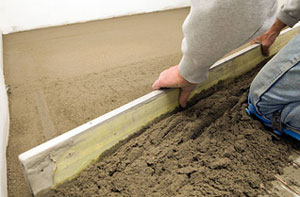
If you're not putting in underfloor heating the screed can now be mixed and prepared in situ and laid. Your use of the room will help the screeding contractor on what sort of screed is right for your requirements. After application of the screed there'll be a minimum 24 hours (for advanced and quick drying screeds) before you can walk upon the surface, and a 72 hrs minimum curing period before any floor covering installations. This timescale is longer for heavy duty and standard screeds and the manufacture's instructions must be followed to the letter to achieve the optimum finish and durability of the floor.
The SR standard of your screeding can be confirmed once it has hardened enough to be walked on. The test involves the use of a 2 mtr long straight-edge laid down upon the surface and any variations from true are measured.
- SR1 - Over the whole area, if there are no disparities of more than 3 millimetres from the straight-edge, then you have a top specification SR1 standard surface.
- SR2 - The normal standard flooring in industrial and commercial builds is classed as SR2 and has a maximum deviation of five millimetres across the whole screeded floor.
- SR3 - SR3 is utility standard where a quality finish isn't necessary. This classification allows for a maximium deviation of ten millimetres.
If you need to check the floor for load bearing, a qualified structural engineer is necessary to conduct the testing. Using specialist equipment the engineer will assess the screed surface strength and its suitability for use in a load bearing environment. The screed will be given what's known as a "drop hammer test" to measure strength and flexibility at different points. Any screeding that has load bearing requirements must be sanctioned by a fully qualified structural engineer heeding the British Standards BS8204 guidelines. (Tags: Floor Screeding Services Sandown, Screeding Sandown, Floor Screed Sandown, Floor Screeding Sandown).
Screeding services are available in Sandown and also in nearby places like: Ventnor, Whiteley Bank, Queens Bower, Merstone, Apse Heath, Yaverland, Brading, Luccombe, Newchurch, Adgestone, Wroxall, Lake, Godshill, Winford, Shanklin, Alverstone, Arreton, Ninham, and in these postcodes PO36 8DA, PO36 8DY, PO36 8AL, PO36 8DB, PO36 8DW, PO36 6DF, PO36 8DU, PO36 8AB, PO36 8EZ, and PO36 9AE. Locally based Sandown floor screeders will likely have the phone code 01983 and the postcode PO36. Checking this should ensure that you are accessing local floor screeding. Sandown homeowners are able to utilise these and countless other comparable services. Home and business owners in need of screeding price quotes can just click on the "Quote" banner.
Screed Reinforcement
Screed reinforcement improves the strength and durability of concrete screeds by reinforcing them. The creation of level surfaces involves applying thin and flat layers of concrete known as screeds to a base layer. In building projects, they have a common use as flooring, and they can also serve as a finishing layer for ceilings and walls.
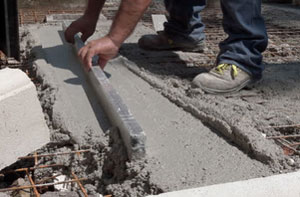
Embedding reinforcement materials, like fibres, wire or steel mesh, into the screed mixture during installation is done to increase strength and prevent cracking. This reinforcement improves the surface's ability to resist impact, thermal changes and abrasion, while also ensuring that load and weight are evenly distributed.
In addition to improving the screed's strength and durability, reinforcement also helps to reduce the risk of cracking and shrinkage caused by changes in temperature or humidity. Proper installation of the reinforcement is crucial to make certain that it is evenly distributed throughout the screed and doesn't get displaced over time. The incorporation of screed reinforcement enables building professionals to ensure that their projects will stand the test of time and provide a functional and high-quality surface for years to come.
Granolithic Screeding Sandown
Granolithic screeding refers to a kind of flooring that consists of a mixture of sand, aggregate and cement. It is applied in a relatively thin layer and then smoothed to provide a durable, hard-wearing and seamless surface. It is often used in public, commercial and industrial buildings where heavy traffic is expected.
The resulting flooring is slip-resistant, easy to clean and hard-wearing, making it ideal for use in areas with high foot traffic, such as shopping centres, schools and factories.
Granolithic screeding is typically applied over a concrete sub-base, and the surface is normally treated with a curing compound to make sure it sets correctly. Once cured, it creates a seamless floor with a smooth, hard surface that is resistant to wear and tear. It is also highly resistant to water and chemicals, which makes it well suited for use in environments where there's a chance of spills or exposure to hazardous materials.... READ MORE. (Tags: Granolithic Screeding Sandown, Granolithic Screed Sandown, Granolithic Floor Screeding Sandown)
Screed Floor Removal Sandown
Renovation and construction often require screed floor removal. This is the process of stripping away existing screed layers from floor surfaces. This approach is essential for the upgrading or refurbishing of a floor. It prepares the surface for the new flooring material or other improvements.
This complex task can be safely and effectively performed by skilled contractors who have the expertise and experience in screed floor removal. A fresh start for the floor is set by the safe and successful elimination of the old screeding, which is ensured by their proficiency. The significance of this fresh start is manifold, including repairs, upgrades and changes in design.
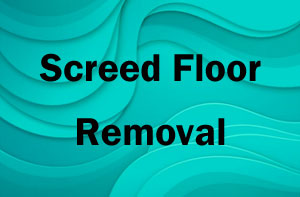
Removing floor screed is a complex process that requires the use of specialist techniques and equipment, tailored to the specific needs of the job. The thickness and type of the existing screed, along with the surface of application, require meticulous evaluation. This attention to detail ensures that the removal is carried out successfully, with minimal disruption to the underlying structure.
Removing floor screed has the advantage of allowing you to fix any underlying problems that might have developed over the years, which is a key consideration. If the old layer of screed is damaged, uneven, or compromised, its removal allows for a thorough examination of the substrate. Contractors can use this evaluation to identify and rectify any structural problems that could affect the installation of new flooring materials.
In addition, the removal of the screed floor is an imperative initial process for underfloor heating system installation in Sandown. A conducive surface for the installation of heating elements is created by contractors through the removal of the pre-existing screed, ensuring it is level and clean. This paves the way for an efficient and effective underfloor heating setup, improving the comfort and energy efficiency of the space.
The removal of screed flooring adheres to sustainability principles, focusing on reusability and waste reduction. Extracted screed often finds a second life in new projects, minimising the environmental impact of its removal.
In summary, the removal of screed floors is a crucial and intricate process in the field of construction and renovation. Negotiating the challenges of of removing existing screed layers while ensuring the safety and integrity of the fundamental structure requires the expertise of specialist contractors. In a range of different commercial and residential settings in Sandown, screed floor removal contributes to the creation of efficient, hard-wearing, and visually pleasing flooring solutions by enabling a fresh start for the floor. (85754 - Floor Screed Removal Sandown)
Screeding Related Tasks

There are a whole host of tasks that can be undertaken by your local Sandown floor screeder including subfloor repair, floor preparation services, domestic screeding Sandown, damp proof membranes Sandown, garage floor screeding in Sandown, concrete floor moisture testing, external screeding, substrate floor preparation, sand and cement screeding, wet room floors, floor noise reduction, unbonded screed, cheap screeding Sandown, screed aftercare, resin floor screeding Sandown, factory floor screeding, screed repairs in Sandown, self-levelling screeding, polished concrete flooring, polished screeding, underfloor heating screeds, floor screeding tools, waterproof floor screeding Sandown, screeding advice, lightweight screeding, anhydrite screeding, monolithic floor screeding, bonded concrete floor screeding, floor screeding in Sandown, floating screed, coloured floor screeding Sandown, rapid strength screeding, acoustic flooring solutions, shop screeding, floor resurfacing, and lots more floor screeding tasks. Listed are just a handful of the activities that are handled by those installing screeding. Sandown specialists will inform you of their whole range of floor screeding services.
Floor Screeding Near Sandown
Also find: Newchurch floor screeding, Whiteley Bank floor screeding, Ventnor floor screeding, Ninham floor screeding, Brading floor screeding, Shanklin floor screeding, Luccombe floor screeding, Merstone floor screeding, Arreton floor screeding, Adgestone floor screeding, Queens Bower floor screeding, Lake floor screeding, Alverstone floor screeding, Wroxall floor screeding, Yaverland floor screeding, Apse Heath floor screeding, Winford floor screeding, Godshill floor screeding and more. Screeding services are widely available in the majority of these towns and villages. These seasoned professionals, by virtue of their expertise and knowledge, are capable of delivering top-quality flooring solutions. Whether it’s for residential or commercial properties, they are proficient in screeding and make sure that the work is completed to the highest possible standards. Local residents can obtain screeding quotes by going here. Kick-start your screeding project today, without delay!
More: Screeding Specialists, Decorative Screeding, Cheap Screeding, Floor Levelling Services, Cheap Floor Screeding, Decorative Screeding, Screeding, Screeding Companies, Screeding Specialists, Screeding Services, Screeding Services, Coloured Screeding, Flooring Contractors, Residential Screeding, Screed Flooring, Floor Screeders, Self-Levelling Screeds, Commercial Screeding, Commercial Screeding, Floor Levelling Services, Coloured Screeding, Cheap Floor Screeding, Screed Flooring, Screeding Contractors, Polished Screeding, Residential Screeding, Polished Screeding, Decorative Screeding, Decorative Screeding, Residential Screeding, Decorative Screeding, Screeding Specialists, Self-Levelling Screeds, Screeding, Driveways, Driveway Installation, Concrete Driveways.
Floor Screed Companies Sandown - Commercial Screeding Sandown - Screeding Sandown - Screeders Sandown - Domestic Screeding Sandown - Floor Levelling Sandown - Floor Screeding Quotes Sandown - Floor Screeding Services Sandown - Self-Levelling Screeding Sandown


